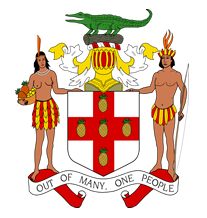The island - discovered by Christopher COLUMBUS in 1494 - was settled by the Spanish early in the 16th century. The native Taino, who had inhabited Jamaica for centuries, were gradually exterminated and replaced by African slaves. England seized the island in 1655 and established a plantation economy based on sugar, cocoa, and coffee. The abolition of slavery in 1834 freed a quarter million slaves, many of whom became small farmers. Jamaica gradually increased its independence from Britain. In 1958 it joined other British Caribbean colonies in forming the Federation of the West Indies. Jamaica gained full independence when it withdrew from the Federation in 1962. Deteriorating economic conditions during the 1970s led to recurrent violence as rival gangs affiliated with the major political parties evolved into powerful organized crime networks involved in international drug smuggling and money laundering. Violent crime, drug trafficking, and poverty pose significant challenges to the government today. Nonetheless, many rural and resort areas remain relatively safe and contribute substantially to the economy.
Jamaica is a parliamentary democracy under a constitutional monarchy and part of the Commonwealth realm.
Members:
Resources
Displaying 71 - 75 of 77Land Bonds Act.
The Act makes provisions for the issue of land bonds and in relation to this provides for the establishment of a Land Bond Fund. Section 3 provides for payment in land bonds with consent of vendor, whereas section 4 provides for payment in land bonds for scheduled land, being land of a category specified in the Schedule that is compulsorily acquired.
Land Development and Utilization Act.
This Act makes provision for the use and development of land. The Land Development and Utilization Commission, established under section 12, may with the approval of the Minister, from time to time, by order designate as agricultural land any land, which the Commission considers ought to be brought into use for agriculture.
Town and Country Planning (Appeal Tribunal) Rules, 1997.
These Rules outline requirements for and procedures of notification of appeal and appeal with the Tribunal against enforcement notices pursuant to provisions of the Town and Country Planning Act. A notice shall be accompanied by the following documents: (1) the enforcement notice to which the appeal relates; (ii) where the relevant enforcement notice requires the cessation of work in any development, a certificate from the Government Town Planner certifying that the work has ceased in conformity with that Notice (rule 3). (5 rules)
Natural Resources (Prescribed Areas) (Prohibition of Categories of Enterprise, Construction and Development) Order, 1996.
No person shall, from the 1st day of January, 1997, undertake any of the categories of enterprise, construction or development specified in Column A of the Schedule, within the area specified in Column B thereof, except under and in accordance with a permit issued by the Natural Resources Conservation Authority. This requirement shall not apply to any category of enterprise, construction or development which was in existence before the 1st of January, 1997. (2 sections and a Schedule)
Natural Resources Conservation (Permits and Licences) Regulations 1996.
These Regulations provide for the grant of permits for activities in prescribed areas in the sense of section 9 of the Natural Resources Conservation Authority Act and the grant of licences in accordance with section 12 of the same Act for existing facilities. The Conservation Authority may, by notice, require the owner or any person having the charge or management of an existing facility to upgrade such facility to current standards applicable to new facilities (reg. 9). Regulation 13 provides for renewal of licences, regulation 15 for the revocation of suspension of a licence.


